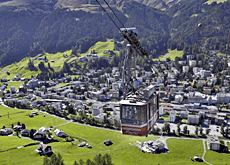Artificial snow might not save resorts

Winter resorts should think twice about investing in artificial snow installations, according to the Swiss snow and avalanche research institute.
A study it presented on Friday points out that one in five ski slopes in the country needs artificial snow to remain open during the winter season.
This number is set to increase as the presence of snow is considered a condition for the economic viability of a ski resort. In Austria, this figure rises to one in two, while some Italian resorts rely entirely on artificial snow.
Many lower and medium-altitude Swiss ski resorts are already using snowmaking machines to boost the snow cover. But the institute warns that there is a downside to the practice.
It says that if temperatures continue to rise because of global warming, snow at below 1,500 metres will melt rapidly, threatening the livelihood of lower and medium-altitude resorts.
But rising temperatures also make it harder to compensate for the lack of natural snowfall. Snow cannon can only work effectively at low temperatures.
By 2050, temperatures in the Alps are expected to be 1.8 degrees Celsius higher than in 1990.
This means the snowline will not only climb higher, but the use of artificial snow facilities will also be limited.
With today’s technology, it will be difficult to guarantee snow cover from top to bottom for a full season if a resort is below 1,500 metres. The study’s authors suggest that resorts consider improving transport towards areas where snow is available.
Ecological concerns
The report also states that pumping water to create artificial snow puts a strain on available resources. In Davos for example, up to one third of the water used goes towards snowmaking.
The authors warn that this could lead to ecological problems. Rivers whose levels are already naturally low in winter could drop below their authorised flow.
Power use is another problem highlighted by the study. In Davos, 0.6 per cent of the area’s total energy goes to snowmaking machines.
For ski resorts, tourism is the backbone of the local economy. In Davos, the winter season alone represents 26 per cent of the area’s income.
If natural snow was in short supply and the use of artificial snow impossible, the resort would see income drop by one tenth, or SFr60 million.
The study suggests that artificial snow is a long-term solution for resorts at higher altitudes which want to attract skiers. For other resorts, the recommendation is to focus on regional strengths and develop attractive summer and winter packages.
Many ski resorts have already taken the bull by the horns and begun considering the implications of global warming on their business.
Nine destinations in the Bernese Alps have started mapping out their future strategy based on another study from Bern University and presented earlier this year.
Some resorts would probably lose ski areas, while others would face problems with their installations due to the thawing of permafrost. The upside of rising temperatures would be that demand for summer holidays would increase, making diversification a possible option for alpine destinations.
swissinfo with agencies
A snow cannon is a device used to produce snow artificially.
It works by atomizing water – splitting it into tiny droplets – and allowing it to freeze into snow.
The device is often used by resorts to supplement naturally occurring snow and extend the skiing season.
The traditional type of snow cannon produces water droplets by combining cooled water and compressed air.
The system works best with low temperatures and humidity.

In compliance with the JTI standards
More: SWI swissinfo.ch certified by the Journalism Trust Initiative











You can find an overview of ongoing debates with our journalists here . Please join us!
If you want to start a conversation about a topic raised in this article or want to report factual errors, email us at english@swissinfo.ch.